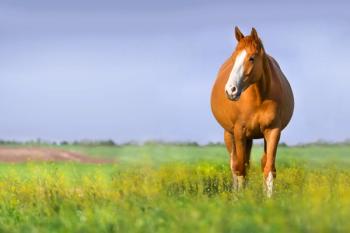
Study conjoins MRLS, pericarditis
Lexington, Ky.-While mare reproductive loss syndrome (MRLS) was swiftly becoming a household word in Kentucky last spring, animal practitioners in central Kentucky were also reporting an influx in the number of cases of pericarditis, an uncommon disease involving the heart and the sac around the heart.
Lexington, Ky.-While mare reproductive loss syndrome (MRLS) wasswiftly becoming a household word in Kentucky last spring, animal practitionersin central Kentucky were also reporting an influx in the number of casesof pericarditis, an uncommon disease involving the heart and the sac aroundthe heart.
As researchers scrambled to determine a cause for MRLS, questions aboundedas to whether the syndrome and pericarditis were linked.
A recently completed study provided scientific evidence confirming arelation between MRLS (which included early fetal loss and late-term abortions)and the pericarditis cases.
"These both occurred at the same time and both in such large numbers,"says Dr. Nathan Slovis of Hagyard-Davidson-McGee, who collected data forthe study. "We can say MRLS and pericarditis in Kentucky this springwere related; they might not be brother and sister, but they certainly arecousins. They have to share at least some of the factors with MRLS.
"We all believe this (pericarditis) is a multi-factoral disease,"he tells DVM Newsmagazine. "It isn't just one toxin that occurred."
Data for the study was also collected by Lexington-based Dr. JohannaReimer of Rood and Riddle Equine Hospital, and then analyzed by a groupheaded by Dr. Noah Cohen of Texas A&M University. Other team membersincluded Drs. Vincent Carey, James Donahue, Janyce Seahorn, Chris Smithand Shelly Lenz.
The study analyzed 38 affected horses and 30 control horses. Researcherspoint out that the small sample size can limit the statistical power todetect differences and to note effects of multiple exposures simultaneously.
But according to Cohen, "Confounding can occur in studies of populationsof any size-large or small. In our pericarditis study, after accountingfor effects of caterpillars, many of the associations (pond water, cattle)disappeared; this may have been due to confounding, but also might havebeen attributable in part to small sample size."
Some statistical study points:
* The proportion of cases of pericarditis that were from farmswhere there were mares or foals affected by MRLS (84 percent) was significantlygreater than that of the controls (56 percent).
* There was a significant association of pericarditis with reportedexposure to caterpillars.
* Caterpillars, but not cherry trees, were associated with thedevelopment of pericarditis.
* Pericarditis cases were less likely to have access to pond water(5 percent) than controls (23 percent), indicating an association with managementor water source that may have been protective.
Slovis says some of the findings surprised him, such as the pond water,but not all.
"As for the aspect in regard to cherry trees. That didn't surpriseme too much. These animals didn't appear to be exposed to cherry trees likeeverybody kept harping on with the mare reproductive loss syndrome,"he says.
"These findings are markers for the real thing," he says. "Weneed to find out why were these people, for example, bringing in hay fromoutside Kentucky (at least for pericarditis). These are clues to what reallycaused this. These raise your brow as to what is going on."
A larger study by the same group of epidemiologists is under way to lookat early fetal loss and late-term abortions to see if there are any correlationswith the pericarditis study.
Slovis says this study is expected to be completed within the next twomonths.
For now, the cause for MRLS is still not conclusive, says Slovis. "Iknow they're saying cyanide is big. That's hanging on by a loose thread.There are a lot of other factors that we need to see."
Newsletter
From exam room tips to practice management insights, get trusted veterinary news delivered straight to your inbox—subscribe to dvm360.




